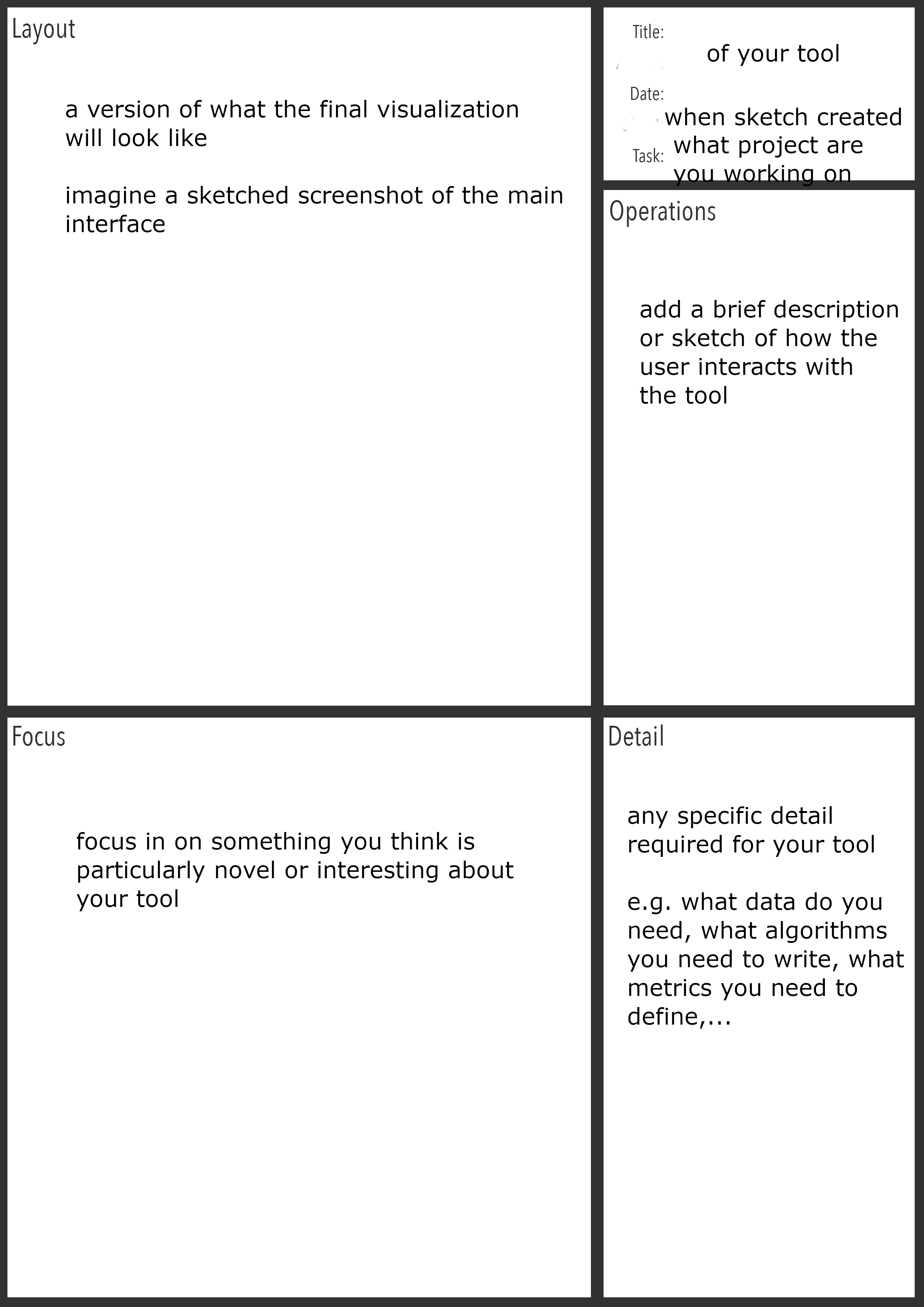Sketching Assignment
Now that you know your project research question and you have explored the data a little, your job is to brainstorm designs that help to clearly communicate your data or help other people to explore the data according to your question.
As we said in class, the best way to come up with a good idea is to have lots of them, and narrow down. Your task in this assignment is to brainstorm many designs, and then use some basic criteria to filter and select the best ideas. You will then hand in a polished version of the final designs that you chose.
The goal of this exercise is to show you that if you have an open mind, your first idea is (unlikely) to be your best idea. Instead, the process of brainstorming, discussing and affinity diagramming can help you find good ideas that you had not considered before.
Important:
- do not limit yourself to things you know how to build yet
Many of the steps for this assignment you will have finished in class already
Your Mission
Brainstorm session. With your group, schedule a mutual time that you can get together and work for at least an hour together. Brainstorm and sketch ideas -- one each on a single sheet of paper. The goal here is to sketch as many distinct ideas as you can -- you should aim for -- at least -- four sketches a person. Anything goes: crazy or boring, whole system or even just a small piece of the system. You are aiming here for variance: the ideas should be different from one another. You are allowed to build off of one another's ideas, but make sure that they're different. If you end up with a bunch of sketches that are essentially variations on the exact same idea, try again, because you didn't do it right.
We will have practiced this in class, but you might need to do the exercise again if you did not get enough variation.
- Affinity diagramming session. This can be part of your brainstorming session, or a different one altogether. As a group, go through each of the sketches one by one, discussing the main idea of the sketch. Construct an affinity diagram with these sketches, or with ideas extracted from the sketches. At the end of this, you will have several different groups of ideas. Discuss each of these groups in relation to your project, their weaknesses, strengths, feasibility and originality.
- Select and polish ideas. From your affinity diagramming session, select the two most promising ideas (three if you are in a group of three), discuss them
- Re-sketching your most promising ideas: Re-sketch the 2 (or 3 for groups of 3) sketches you found most promising neatly on a piece of paper. The layout of the paper should have the following categories (left) - see a simple example on the right:
 |  |
- Your sketch needs to be understandable by others, so add legible annotations and/or provide descriptions where appropriate.
- Each person should do one sketch.
- Don't put your name on the sketch
Deliverable:
- Digitize your sketches (you can photograph them, if you don’t have a scanner at hand) as .jpg images of at least 2000px resolution on the shorter side. The text and details of your sketch need to be clearly visible. Name each image so that we know which student drew which final sketch.
- You should submit the 2 or 3 re-sketched sketches and name them STUDENTNAME-FINAL-SKETCHNUMBER.jpg. Also submit the original 4 sketches per person you created as part of the brainstorming process. These sketches should NOT need to be in the re-sketched format shown in the images above. They should be named STUDENTNAME-DRAFT-SKETCHNUMBER.jpg.
- Send all sketches via email in a zip file. The zip files should be named: yourlastnames-assignment3.zip
Your Deliverable
- WHAT - The zip file with the digitized sketches.
- WHERE - You should email the file to petra.isenberg@inria.fr with the subject InfoVis-Assignment 3.
- WHEN - The deadline for handing in the assignment is end of the day onJanuary 6th